Table of Contents
Your daily tea is more than a comfort; it’s a tool. It sharpens your mind, focuses your thoughts, and energizes your actions. Welcome to our guide to discovering the tea that helps you focus. Whether you’re a health-conscious individual, a productivity enthusiast, or simply a tea lover, this guide is your gateway to unraveling the secrets of which tea is best for focus; plus, we will debunk the common myths that swirl around your cherished cuppa.
Which tea is best for focus?
Now, let’s discuss some teas that help you focus. From the classic green to the exotic Matcha, the refreshing peppermint, the ancient Ginkgo Biloba, and the fiery ginger, each cup holds a secret to unlocking your potential. They are more than tea to help you focus; they are your allies in the quest for clarity and vitality.
Green tea
Green tea is the minimalist of teas because it undergoes the least processing, keeping its leaves unoxidized. This light touch helps maintain its signature green hue and preserves antioxidants.
Packed with antioxidants like epigallocatechin gallate (EGCG), green tea is like a health elixir. It’s linked to perks like sharpened brain function, a nudge in weight loss, and a guardian against heart disease.
Studies highlight EGCG’s role as a defender against neurodegenerative diseases like Alzheimer’s. Its antioxidant, anti-inflammatory, and anti-aging properties offer a promising avenue in neuroprotection research (1).
Green tea isn’t just about EGCG; it also boasts L-theanine, an amino acid that helps balance relaxation with alertness (2, 3).
For those who find coffee too strong, green tea offers a milder caffeine level. It’s the perfect middle ground for a gentle lift without the jitters.
Green tea is typically steeped in hot water, but the temperature and steeping time vary. Using water that’s too hot or steeping for too long can result in a bitter taste.
Matcha tea
Matcha is a unique type of green tea that originated in Japan and has gained popularity around the world for its distinct flavor, rich cultural history, and numerous health benefits.
Sipping Matcha is like taking a walk through a lush, green forest. It’s rich, it’s vegetal, with a hint of sweetness dancing on your taste buds. The grade of Matcha determines its flavor profile—the higher the grade, the smoother and less bitter the taste.
Like green tea, matcha is packed with catechins like EGCG. The L-theanine in matcha also works magic for your mental state, promoting a calm yet alert vibe (4).
However, because matcha contains more caffeine than regular green tea, it offers a special sustained energy boost.
Studies have shown that the L-theanine and caffeine duo in Matcha can significantly sharpen your focus and enhance cognitive flexibility. It’s perfect when your brain needs a little extra zing (5).
Preparing Matcha is a meditative ritual. Whisking the powder in hot water with a bamboo chasen (whisk) creates a frothy, soul-soothing elixir.
Peppermint tea
Peppermint tea is a beloved herbal brew, cherished for its crisp, minty essence and many health benefits.
Being naturally devoid of caffeine, peppermint tea is an excellent choice for those seeking a calming, non-stimulant beverage, perfect for unwinding after a busy day or enjoying a peaceful evening.
Peppermint tea is widely acclaimed for its digestive benefits. It’s a go-to remedy for relieving stomach upsets, easing indigestion, and alleviating symptoms of irritable bowel syndrome (IBS) (6).
Moreover, its decongestant properties make it a useful ally against colds and respiratory issues, clearing congestion and soothing sore throats, helping you to keep your focus up with a sharp and healthy body (6).
Brewing peppermint tea is easy. Whether you use dried or fresh leaves, steeping in hot water unleashes its flavor. Adjust the steep time and leaf quantity to suit your taste for a more personalized experience.
It’s worth mentioning that one intriguing study found that combining peppermint with white tea amplifies both their antibacterial and anti-inflammatory activities (11). Thus, you can also try blending your minty herbs with some white tea.
Ginkgo Biloba
Ginkgo Biloba tea is crafted from the leaves of the Ginkgo Biloba tree (also known as the maidenhair tree), bringing a touch of timeless tradition to your tea time.
The Ginkgo Biloba tree is like a living fossil, with a lineage stretching back millions of years. Mild with a hint of sweetness, Ginkgo Biloba tea is an earthy delight.
Famed for potentially enhancing cognitive functions, this tea is a favorite among those looking to sharpen their focus, improve memory issues, and support overall brain health. While science still connects the dots, many claim it can clear the mental fog (7, 8).
Furthermore, Ginkgo Biloba tea is ideal for those sensitive to caffeine or seeking tranquility in their cup.
To enjoy a cup, steep dried Ginkgo Biloba leaves in hot water. Found in herbal stores or as part of eclectic tea blends, these leaves transform into a subtly sweet, earthy potion.
While generally safe, Ginkgo Biloba can cause issues when mixed with certain medications, like blood thinners and antidepressants. It’s wise to consult your doctor before incorporating it into your routine.
Ginger tea
Ginger, derived from the ginger plant’s root, ginger tea offers a unique blend of zest and wellness. Its preparation involves steeping ginger, which can be sliced, grated, or ground in hot water. The resulting brew is a flavorful mix of spicy and slightly sweet notes, often enhanced with honey or lemon for a diverse taste experience.
Unlike brews with a caffeine punch, this caffeine-free wonder can help you focus by easing digestion and nausea. Feeling the onset of a cold or flu? A cup of ginger tea can be your soothing ally, potentially bolstering your immune system. For those battling inflammation or aches, ginger tea is the drink you need.
Although ginger contains several nutrients, the main health perks of ginger tea stem from gingerol, a compound known for its antioxidant and anti-inflammatory qualities (9).
Best teas for energy while working
Before we delve deeper into the power-packed world of teas, let’s pause for a moment.
Picture yourself in the midst of a hectic workday, craving a burst of energy without the jittery aftermath of coffee. This is where teas for energy come in. From the culturally rich Yerba Mate to the classic vigor of Black Tea and the ancient wisdom of Ginseng Tea, each brew holds the key to sustained energy and enhanced focus.
Yerba mate
Think of Yerba mate as a fusion of coffee, tea’s health perks, and chocolate’s joy – all rolled into one. It’s a cultural icon in South America and an emerging global sensation.
The distinctive brew is crafted from the leaves and twigs of the Ilex paraguariensis plant. The traditional preparation involves drying and chopping the leaves, then steeping them in hot water. Modern preparations are often customized with lemon, milk, or sugar.
Yerba mate boasts a robust, earthy flavor with a hint of bitterness, similar to green tea but with its unique twist. With caffeine levels comparable to coffee, yerba mate is a popular choice for those seeking an energizing boost.
For the fitness enthusiasts, yerba mate can be a game-changer. Its caffeine content not only boosts energy but also enhances physical performance. It can improve muscle contractions and reduce fatigue during exercise, potentially increasing fat burning (10).
Packed with antioxidants, yerba mate is also celebrated for its numerous health benefits. These include anti-inflammatory and cholesterol-lowering properties, and some studies suggest it can aid in weight loss and heart health (11).
Black tea
Packing more caffeine than green or white teas, yet gentler than coffee, black tea is your ally for a gentle energy lift, perfect for morning starts or afternoon lulls.
Recent studies have shown the various health benefits of black tea. With its rich array of polyphenols like epigallocatechin gallate, theaflavins, and L-theanine, black tea can help fight inflammation and chronic diseases (12).
Like all teas, black tea is also packed with L-theanine. A study reveals its power to soothe stress-related symptoms, enhance sleep quality, and sharpen cognitive functions. It’s not just about relaxation; it’s about rejuvenating your mental well-being (13).
Whether enjoyed plain, with milk and sugar or as part of a flavored blend, black tea can offer you a satisfying and invigorating experience.
Ginseng tea
Ginseng, rooted in the soils of North America and Eastern Asia, gifts us with its unique, aromatic root. You can dive into a cup of ginseng tea, made from either the potent Asian ginseng (Panax ginseng) or the milder American variety (Panax quinquefolius), and savor a taste that’s earthy and subtly sweet.
Ginseng is well-known in traditional Chinese medicine for its cognitive function enhancement, inflammation-soothing abilities, and energy-boosting prowess.
A systematic review examined the prowess of ginseng in battling fatigue. While some studies suggest its potential to energize and revitalize. However, the current evidence suggests we need more extensive, robust research to confirm the effect of ginseng on fatigue and physical performance (14).
Another review of ten studies reveals that ginseng might significantly uplift those grappling with chronic fatigue syndrome (15).
These two reviews suggest that Ginseng tea can be a hopeful option for invigorating tiredness and a caffeine-free companion for those seeking a natural boost.
Steep sliced ginseng root in hot water and watch the magic unfold. Or, if you’re feeling adventurous, simmer the root to unlock even more flavorful secrets. You’ll also find ginseng mingling with other herbs in tea bags.
Common myths when drinking tea
Ready to start drinking tea? But hold on, the internet is a wild jungle of myths and tall tales about drinking tea. It can get confusing, but do not worry; we’re here to cut through the fog of misinformation. Let’s debunk these myths together and clear the path to a true and enjoyable tea experience.
Does tea dehydrate you?
The notion that tea dehydrates you is like an urban legend – it’s out there, but the reality is more nuanced.
The dehydration myth mainly revolves around caffeine, a diuretic found in many teas. Diuretics increase urine production, which, in theory, could lead to dehydration (16).
While it’s true that caffeine is a diuretic, the amount in most teas is quite modest compared to a strong cup of coffee. This means the diuretic effect of tea is much less. For tea to significantly increase urination, you’d need to drink it in large amounts.
Studies suggest that moderate caffeine intake – about 3-6 cups of tea per day – doesn’t dehydrate you (17). The water content in tea contributes to your daily fluid intake, keeping you more hydrated than you might think.
Remember, balance is essential. If you’re particularly sensitive to caffeine, or if you’re indulging in stronger brews, it’s good to be mindful of your intake.
Herbal teas have no caffeine?
This is true– herbal tea is the chill, caffeine-free tea in the tea family.
Regular teas, like black, green, white, and oolong varieties, all originate from the leaves of the Camellia sinensis plant. The magic lies in how these leaves are processed – from the minimal processing of white tea to the full oxidation of black tea.
Herbal teas, however, are the creative blend of anything but the traditional tea plant. Think flowers like chamomile, leaves like peppermint, roots like ginger, or even fruits and spices.
Regular teas come with a caffeine kick. The content varies – a robust black tea might wake you up with around 40-70 milligrams of caffeine per cup, while green tea gently nudges you awake with about 20-45 milligrams.
In contrast, herbal teas are naturally caffeine-free. They’re your go-to for a peaceful evening or a soothing, stress-free break.
Tea doesn’t have an expiration date?
Tea doesn’t expire like a carton of milk. However, it doesn’t mean your tea will be in its prime forever.
Tea’s timeline isn’t marked by a rigid expiration date but rather a ‘best before’ date. This subtle distinction pivots on quality, not safety. Over time, the charisma of your tea – its flavor, scent, and vigor can be lost.
One study delves into this phenomenon, examining the lifespan of tea’s antioxidants under commercial storage conditions. It found that these antioxidants, the important contents of your tea’s health benefits, have their ticking clock.
For about three to four months, they stand strong. But as the days roll into six months and beyond, up to a 60-75% loss is seen after about a year, particularly in black and green teas. Yet, white tea, with its tannin-rich profile, and oolong tea, with its enduring qualities, resist this decline better (18).
Proper storage is key to extending tea’s shelf life. Tea should be kept in a cool, dark place, away from direct sunlight, moisture, and strong odors. Avoid keeping tea in airy and humid places as they can lead to stale flavors and even mold growth in extreme cases. Airtight containers are your best solution.
For the best cup, it’s recommended to consume tea closer to its ‘best before’ date. Fresh tea equals more vibrant flavors and aromas.
Drinking green tea burns fat?
Green tea and its fat-burning prowess can’t do the work for you, but they sure can help make your efforts more effective.
Green tea is a powerhouse of antioxidants, notably catechins, with EGCG (epigallocatechin gallate) being the standout. Coupled with caffeine, they work together to possibly boost thermogenesis—The way that the body generates heat, which burns calories. It’s like stoking a fire inside you, revving the body’s internal furnace to burn more energy (19).
One study explored how green tea extract impacts fat oxidation and glucose tolerance. They found that men who took green tea extract before exercising burned 17% more fat than those who didn’t. It’s like giving your body’s fat-burning ability a gentle nudge (20).
Another exciting aspect is green tea’s potential effect on insulin sensitivity. Improved insulin sensitivity means your body can manage sugar better, which is good for your blood sugar levels, diabetes, and overall health.
Black tea has the most caffeine?
Black tea is not the most caffeine tea among other teas, but it does have high levels of caffeine.
Generally, black tea contains more caffeine than other types of tea, like green or white tea, but less than a typical cup of coffee.
On average, a cup of black tea has about 40-70 milligrams of caffeine, compared to green tea, which usually has around 20-45 milligrams. But here’s where it gets interesting – the caffeine crown in the tea realm goes to matcha. This finely ground green tea powder can deliver up to 70 milligrams of caffeine per serving.
However, the caffeine content in tea can vary widely depending on factors like the specific type of tea, where it’s grown, and how it’s brewed. Steeping your black tea longer or using hotter water can extract more caffeine.
We’ve cleared up some myths about tea. First off, tea won’t make you dehydrated; actually, it helps keep you hydrated if you don’t drink too much. Herbal teas don’t have caffeine, so they’re great for relaxing without the energy boost. Tea doesn’t go bad quickly like milk, but it’s best to drink it before the date on the pack for the best taste. Green tea can help with weight loss, but just a nudge. Black tea has quite a bit of caffeine, but Matcha has even more.
Tips for drinking tea to help focus
Have you ever wondered how to make your tea habit not just a pleasure but a productivity booster? We’ve got some great tips to help make your tea breaks more than just enjoyable but also a way to boost your focus.
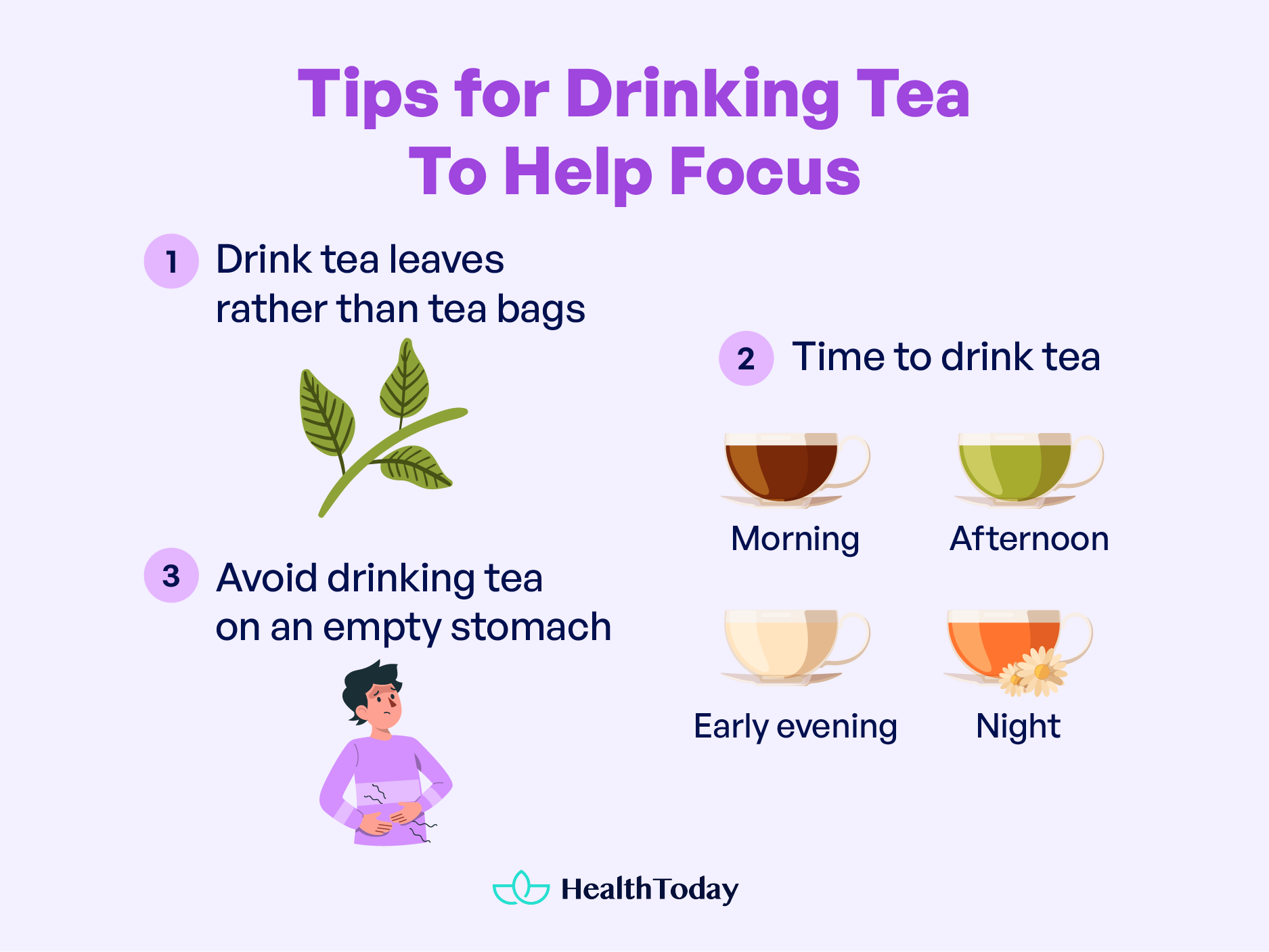
Drink tea leaves rather than tea bags
Choosing loose-leaf tea over tea bags is like opting for a handcrafted experience over a quick, mass-produced alternative.
Think of tea bags as the fast food of the tea world: convenient but often made from smaller pieces of tea leaves, known as ‘dust’ or ‘fannings.’ These tiny particles can lose their essential oils and aroma more rapidly than whole leaves.
On the other hand, loose-leaf tea leaves are whole or large pieces, retaining their exquisite oils and intricate flavors. This results in a richer, more complex cup of tea, offering a symphony of tastes that evolve with every sip.
The larger surface area of loose-leaf teas means they can release more antioxidants, vitamins, and minerals into your brew. These compounds, like catechins and polyphenols, are celebrated for their health benefits, potentially reducing the risk of chronic diseases and supporting overall wellness.
Furthermore, loose-leaf teas can be re-infused more times than bagged teas, retaining antioxidant capacity even up to the sixth brew (21).
When to drink tea?
Let’s look into this rhythmic journey with tea, guiding you from morning to night, and see what teas are best at each moment.
Mornings call for a robust kick-start, and what better way than with a strong black tea? It’s rich in flavor and has enough caffeine to wake you up gently but effectively. If you’re the type who likes a bit of creaminess, a splash of milk can mellow out these strong brews.
As the day progresses, a milder boost is often all you need. This is where green and oolong teas come into play. They’re like a gentle nudge rather than a sharp poke, offering a milder caffeine boost and rich antioxidants. These teas are perfect for keeping you alert and focused without overwhelming your senses.
For dinner or early evening, oolong, white, or decaffeinated teas are your soothing companions. They offer a delicate balance, which is enough to engage your senses but not so much as to disturb your approaching bedtime.
Caffeine-free herbal or fruit teas are the best choice for night time. Chamomile, lavender, or lemon balm teas are excellent choices, known for their calming properties.
Avoid drinking tea on an empty stomach
Drinking tea on an empty stomach can shock your system.
Tea, especially certain types like black or green tea, is acidic. On an empty stomach, this acidity can stir up waves, leading to discomfort like nausea or a bloated feeling. It’s especially tricky for those with sensitive stomachs or issues like acid reflux.
On an empty stomach, the caffeine in tea can kick in faster and harder. This might lead to nervousness, dizziness, or an increased heart rate, which is not the most pleasant start to your day.
To make your tea experience more comfortable and enjoyable, consider pairing it with a simple snack such as toast or a few crackers, which can lay a friendly foundation for your tea.
Is matcha or coffee better for focus?
Both drinks are great for focus, but they hit differently. Matcha offers a more mellow buzz, thanks to L-theanine, which promotes calm and focus with fewer jittery side effects of coffee. Coffee, on the other hand, is the heavyweight champion of caffeine, giving you a quicker, more intense boost. So, if you want a gentle nudge towards focus, go for matcha. If you need a turbo boost, try coffee.
What tea is good for ADHD?
For those with ADHD, the tea world has some chill options. Herbal teas like chamomile or lemon balm are like a mellow playlist for your brain because they don’t eliminate the noise but definitely turn the volume down. Green tea is another good pick. It’s got less caffeine than coffee and includes L-theanine, which can smooth out energy spikes without making you feel like a zombie.
Does tea affect dopamine?
Tea might directly affect your dopamine, but it’s got a decent connection. It works more like a background app, subtly influencing brain chemicals, including dopamine. The L-theanine in tea, especially green tea, can indirectly affect dopamine levels, improving mood and focus.
What is the healthiest tea to drink daily?
Green tea can be your best option. It’s packed with antioxidants, has just the right amount of caffeine, and is linked to many health benefits, from improved brain function to a lower risk of heart disease. Drinking it daily is like giving your body a regular tune-up.
What is the unhealthiest tea?
Labeling any tea as the “unhealthiest” is subjective. However, heavily sweetened teas or those “tea” drinks loaded with sugars and artificial flavors are the bad boys of the tea world. If your tea tastes more like a dessert, it’s probably not doing you any favors health-wise.
Summary
So there you have it, tea enthusiasts and focus finders. We’ve journeyed through the lush world of tea to help you focus, uncovering not just the types but the science behind tea that helps you focus.
From the cognitive-enhancing powers of green and black tea to the soothing depth of herbal teas like ginkgo biloba, we’ve explored which tea is best for focus for every kind of tea lover. We’ve also debunked some common myths, ensuring your tea journey is as clear as your newly-honed focus.
With practical tips for brewing and timing, your tea ritual is now not just a pause in your day but a powerful tool to sharpen your mind and energize your work.






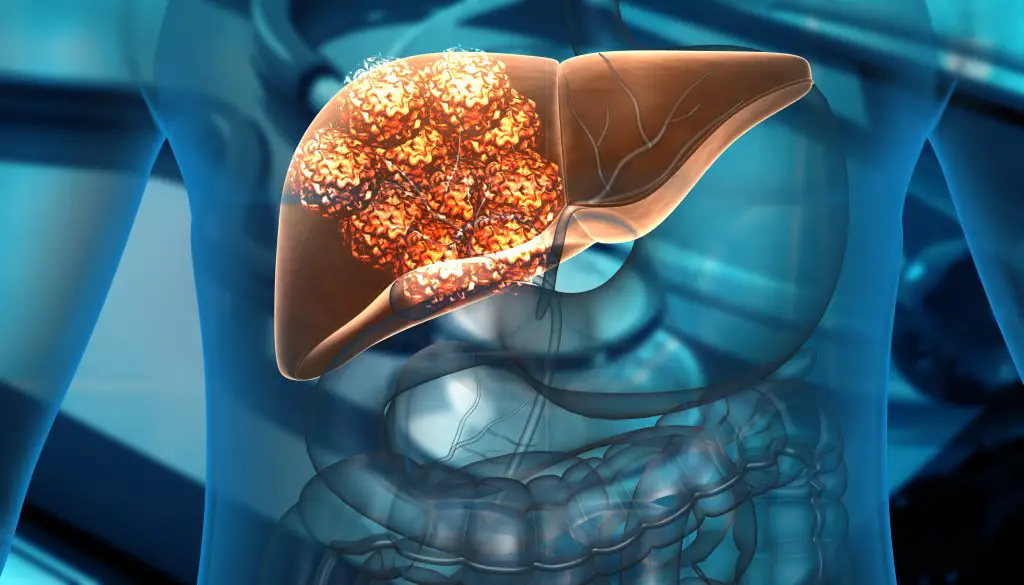
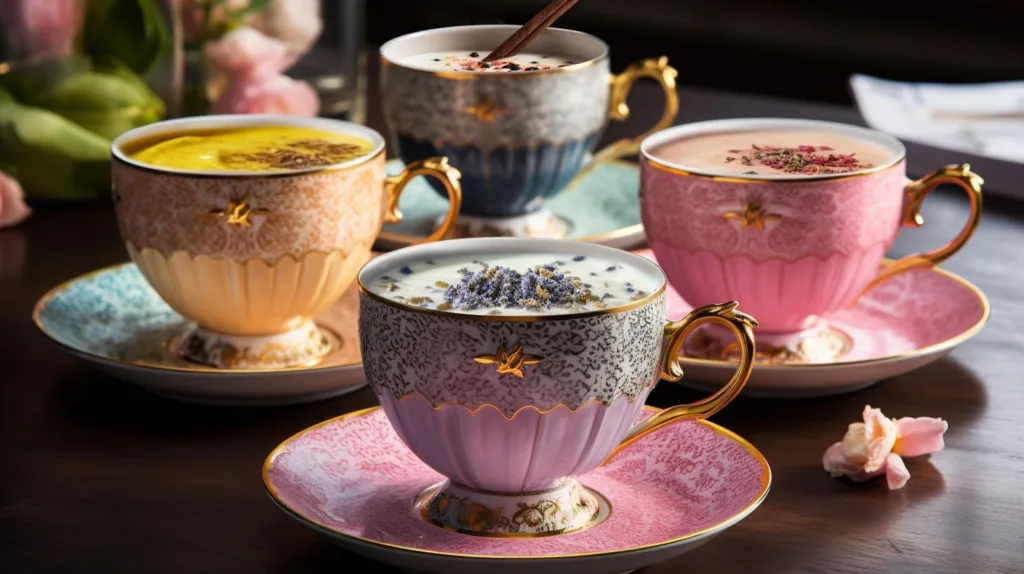

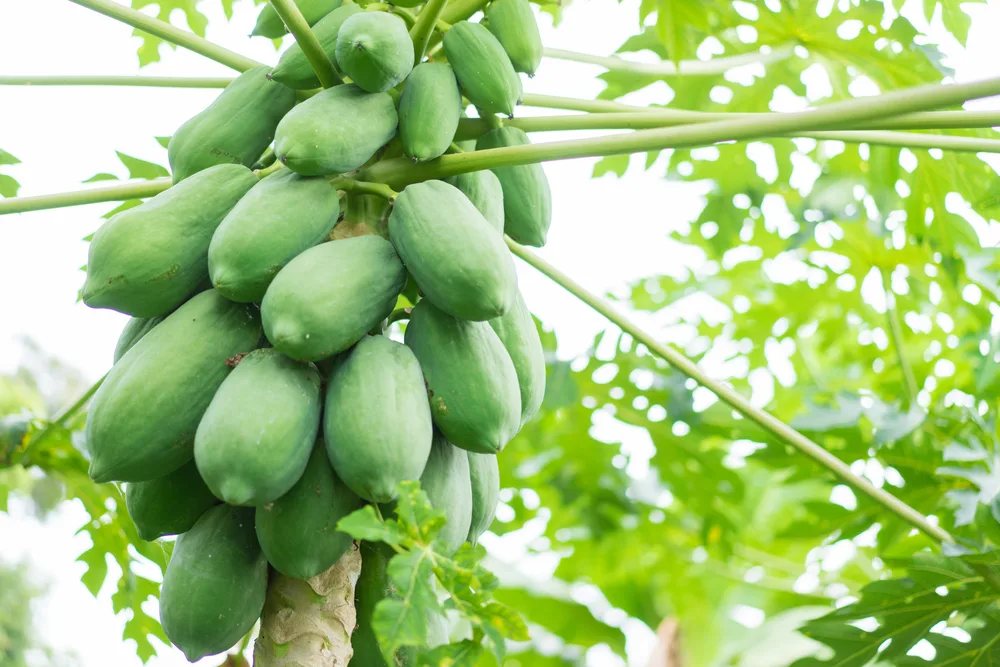
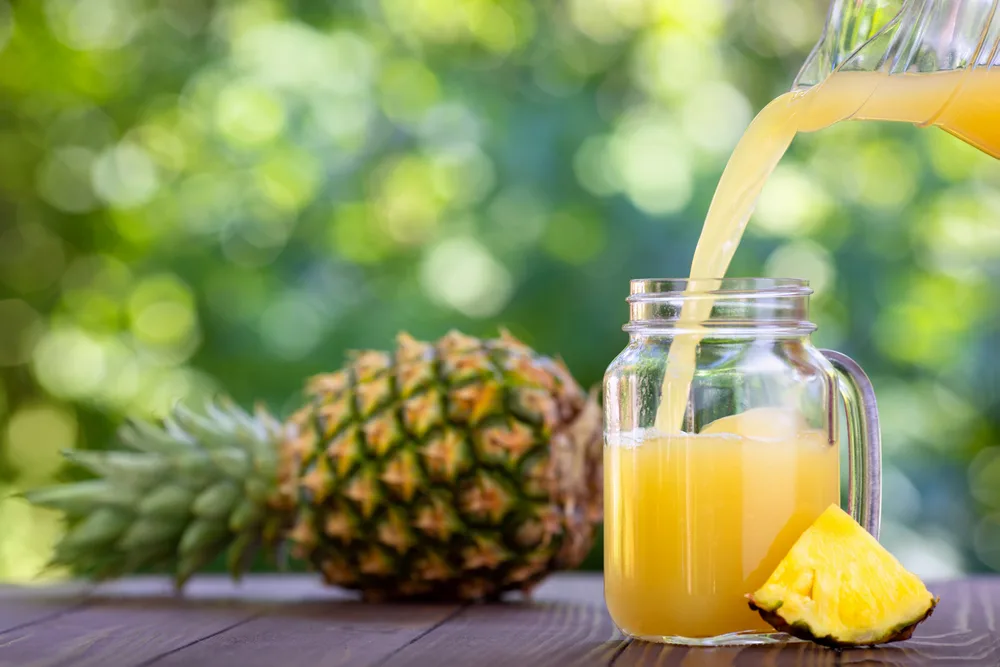






Comments
0